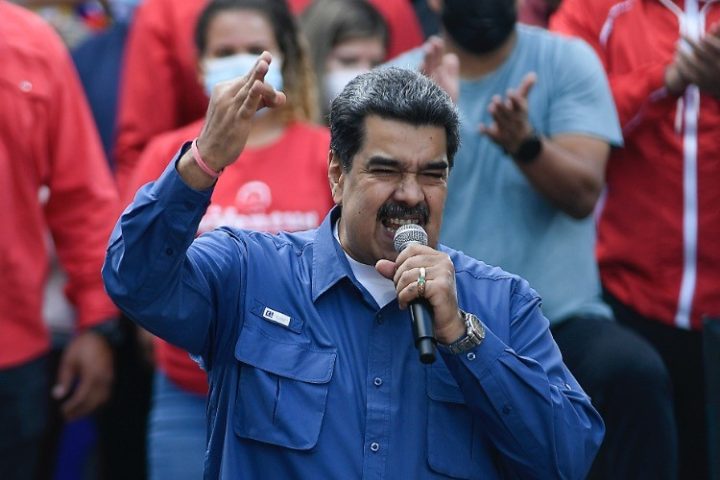
On Tuesday, President Joe Biden announced that the United States will ban the import of oil, gas, and energy from Russia in the wake of that nation’s current military action against Ukraine. Biden said that the new ban is an attack on “the main artery” of Russia’s economy and is meant to put a stranglehold on Russian funding of their war effort.
“Americans have rallied to support the Ukrainian people and made it clear we will not be part of subsidizing Putin’s war,” the president said.
The president also mentioned that American families — already suffering from average gasoline prices of more than $4.00 per gallon — should expect even higher gas prices going forward.
“Putin’s war is already hurting American families at the gas pump since Putin began his military buildup on Ukrainian borders,” Biden said. “And with this action, it’s going to go up further. I’m going to do everything I can to minimize Putin’s price hike here at home and coordination with our partners.”
Some of those “partners” Biden is looking to utilize are raising some eyebrows.
Senior U.S. officials reportedly traveled to Venezuela to meet with the government of Venezuelan President Nicolás Maduro. The socialist Maduro and Venezuela are strong allies of Russia. Venezuela, along with Cuba and Nicaragua, all refused to vote on a United Nations resolution last week condemning Russian aggression in Ukraine.
The United States and Venezuela ceased all diplomatic relations in 2019 after the Trump administration recognized opposition leader Juan Guaidó as Venezuela’s interim president, following an election deemed illegitimate by many international observers. Maduro was found to have won the election and maintained his hold on power.
So, one of the sources to whom President Biden is looking to help ease gasoline and oil prices is one of Vladimir Putin’s strongest allies. Maduro seems more than willing to begin selling oil to whomever wants it.
“Here lies the oil of Venezuela, which is available for whomever wants to produce and buy it, be it an investor from Asia, Europe or the United States,” Maduro said recently.
Another source that the Biden administration may be looking to for oil imports is even more of a head-scratcher — the Islamic Republic of Iran. Although no specific mention of oil imports has been made publicly, negotiations are taking place in Vienna on a new deal with Iran between U.S. negotiator Robert Malley and the Iranian government.
A former State Department official with the Iran Action Group, Gabriel Noronha, has labeled what’s going on in Vienna as “much, much worse” than President Obama’s deal with Iran. Noronha has given some specifics in a Twitter thread, suggesting that the Biden administration is ready to lift sanctions against some of Iran’s most notorious terrorist leaders.
“The deal being negotiated in Vienna is dangerous to our national security, it is illegal, it is illegitimate, and it in no way serves U.S. interests in either the short or long term,” according to Noronha.
And this new Iran deal is being worked out while the world’s attention is focused on the war in Ukraine.
Here’s a novel idea. Why not take the chains off our own energy sector? Believe it or not, in Tuesday’s remarks, President Biden placed some blame on the U.S. energy sector, which has been forbidden to finish the Keystone XL Pipeline and has been banned from exploring for new oil deposits on federal land.
“They have 9,000 permits to drill now. They could be drilling right now, yesterday, last week, last year. They have 9,000 to drill onshore that are already approved,” Biden said.
Energy executives insist that Biden and his administration have no understanding of how the oil business works.
“There’s a fundamental misunderstanding of the administration as to how the process actually works,” said Mike Sommers, the chief executive officer of the American Petroleum Institute.
“Just because you have a lease doesn’t mean there’s actually oil and gas in that lease, and there has to be a lot of development that occurs between the leasing and then ultimately permitting for that acreage to be productive,” Sommers said. “I think that they’re purposefully misusing the facts here to advantage their position.”
In the end, it all comes down to Biden’s own climate-change commitments. It’s apparently fine if oil comes from questionable sources as long as Biden’s climate-change commitments for America aren’t impacted at all.
According to Biden, the current energy crisis should spur us forward in our fight against climate change. “It should motivate us to accelerate the transition to clean energy. This is a perspective, as I said, that our European allies share and the — a future where together we can achieve greater independence,” Biden said today.
And don’t tell Joe Biden that the energy sector needs any help from the federal government — even if the only assistance they need is for the government to get out of their way: “Loosening environmental regulations or pulling back clean energy investment won’t — let me explain — won’t — will not lower energy prices for families. But transforming our economy to run on electric vehicles powered by clean energy with tax credits to help American families winterize their homes and use less energy, that will — that will help.”
Biden offers no immediate assistance to struggling American consumers at all. Instead, his minions negotiate potentially dangerous deals with the likes of Venezuela and Iran and offer pie-in-the-sky platitudes about energy technologies that are simply not capable of keeping up with consumer demand.




